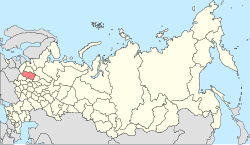Tver, Russia
| Tver Тверь (Russian) |
|
|---|---|
| - City - City of oblast significance |
|
 Views of Tver |
|
 Location of Tver Oblast in Russia |
|
|
|
|
|
|
|
|
|
|
| Anthem | Anthem of Tver |
| Administrative status (as of October 2014) | |
| Country | Russia |
| Federal subject | Tver Oblast |
| Administratively subordinated to | Tver Okrug |
| Administrative center of | Tver Oblast,Kalininsky District, Tver Okrug |
| Municipal status (as of July 2012) | |
| Urban okrug | Tver Urban Okrug |
| Administrative center of | Tver Urban Okrug, Kalininsky Municipal District |
| Head | Yury Timofeyev |
| Representative body | City Duma |
| Statistics | |
| Population (2010 Census) | 403,606 inhabitants |
| - Rank in 2010 | 46th |
| Population (January 2015 est.) | 414,606 inhabitants |
| Time zone | MSK (UTC+03:00) |
| Founded | 1135 |
| Previous names |
Tver (until November 20, 1931), Kalinin (until July 17, 1990) |
| Postal code(s) | 170000–170009, 170011–170012, 170015–170017, 170019–170028, 170030, 170032–170034, 170036–170037, 170039–170044, 170100, 170700, 170880, 170904, 170951–170958, 170960–170978 |
| Dialing code(s) | +7 4822 |
| Website | www |
| on | |
Tver (Russian: Тверь, IPA: [tvʲerʲ]; IPA: [tvʲerʲi]) is a city and the administrative center of Tver Oblast, Russia. Population: 414,606 (2015 est.); 403,606 (2010 Census); 408,903 (2002 Census);450,941 (1989 Census).
Located 180 kilometres (110 mi) northwest of Moscow, Tver was formerly the capital of a powerful medieval state and a model provincial town in the Russian Empire, with a population of 60,000 on January 14, 1913. It is situated at the confluence of the Volga and Tvertsa Rivers. The city was known as Kalinin (Кали́нин) from 1931 to 1990. The city is situated at the conflux of three rivers, splitting the town into northern and southern parts by the Volga River, and then divided up again into quarters by the Tvertsa River, which splits the left (northern) bank into east and west halves, and the Tmaka River which does the same along the southern bank.
Tver’s foundation year is officially accepted to be 1135, although there is no universal agreement on this date and some estimates place it as late as the second half of the 13th century. Originally a minor settlement of Novgorodian traders, it passed to the Grand Prince of Vladimir in 1209. In 1246, Alexander Nevsky granted it to his younger brother Yaroslav Yaroslavich (d. 1271), from whom a dynasty of local princes descended. Four of them were killed by the Golden Horde and were proclaimed saints by the Russian Orthodox church.
...
Wikipedia



